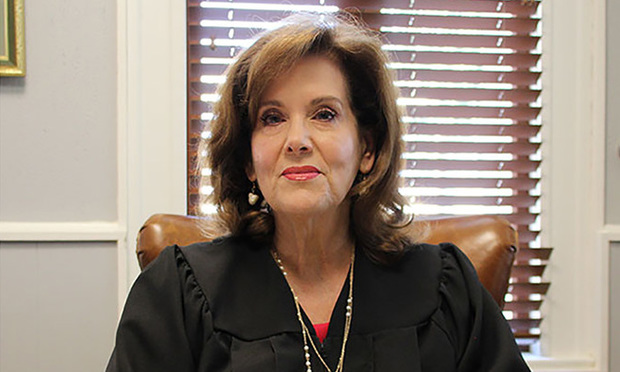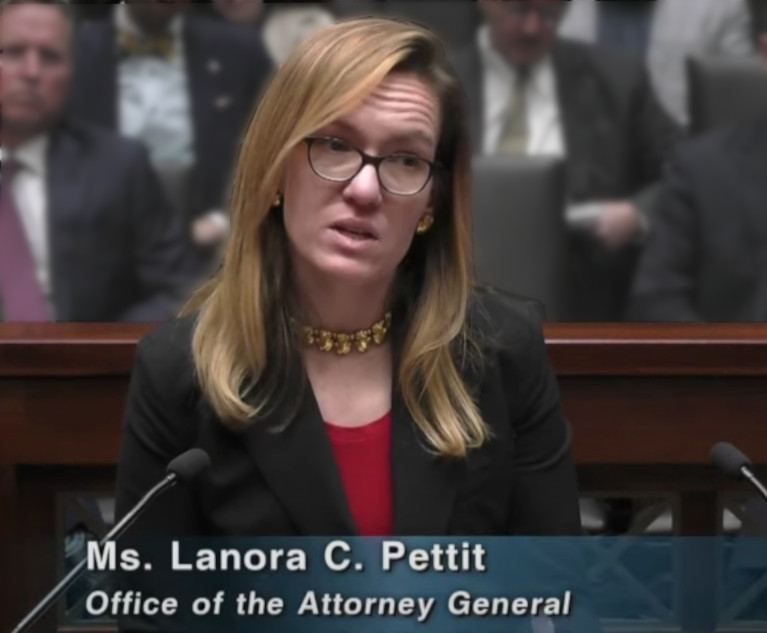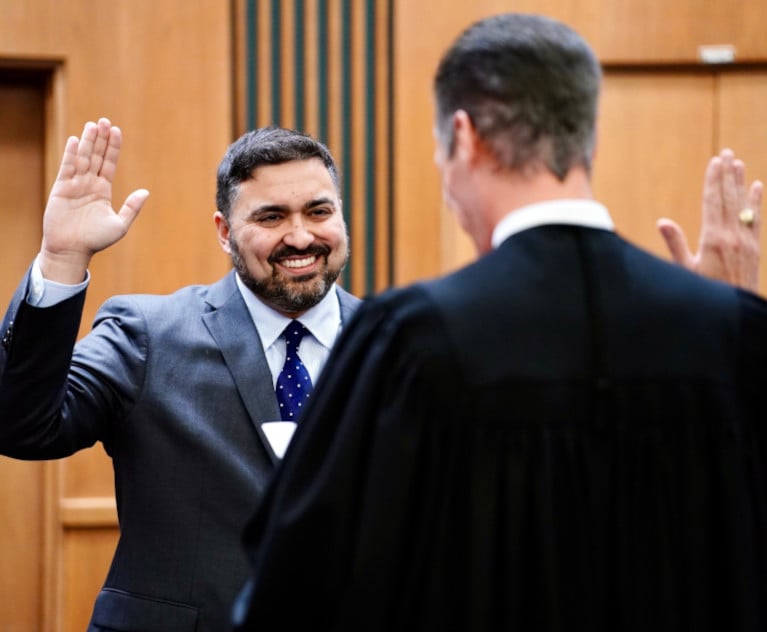Experts Question Judge's Choice to Sue Over Sanction, Rather Than Appeal
Judge Dianne Hensley is challenging a public warning she received for refusing to officiate over same-sex marriages due to her religious beliefs.
December 18, 2019 at 04:41 PM
7 minute read
 Judge Dianne Hensley. Photo courtesy of FirstLiberty.org
Judge Dianne Hensley. Photo courtesy of FirstLiberty.org
Texas judicial experts are questioning Judge Dianne Hensley's legal strategy to sue over her sanction for refusing to officiate same-sex marriages.
A judge can appeal a judicial misconduct sanction to a special court of review, but Hensley, a justice of the peace in McLennan County, instead filed a civil lawsuit alleging that the Texas Commission on Judicial Conduct and all of its officers and commissioners are violating her religious freedom under Texas law.
Hensley's lawsuit, filed in McLennan County District Court, claims her Christian beliefs prevent her from marrying same-sex couples.
One of Hensley's attorneys, Jeremy Dys, said the judge chose to sue the commission because she wants to keep marrying heterosexual couples, but not same-sex couples. Hensley is afraid she will face future sanctions if she does that.
"That would be a continued and growing burden on her free exercise of religion," said Dys, special counsel for litigation and communications at First Liberty Institute, a Plano-based nonprofit firm that focuses on religious freedom.
 Charles 'Chuck' Herring Jr., a partner in Herring & Panzer in Austin. Photo: Joel Salcido
Charles 'Chuck' Herring Jr., a partner in Herring & Panzer in Austin. Photo: Joel SalcidoThe lawsuit could run into problems since Texas law lays out the appellate remedy that she failed to follow, said Chuck Herring, a partner at Herring & Panzer who practices legal ethics law and writes an annual book on lawyer and judicial ethics.
"She could have raised the same arguments before a special court of review," said Herring, partner in Herring & Panzer in Austin. Instead, Herring said he expects the commission to argue Hensley failed to exhaust her proper appellate remedies before filing her lawsuit.
In Texas, a judge can appeal if they're sanctioned by the commission. The Texas Supreme Court then randomly assigns three intermediate appellate justices to a special court of review.
That court conducts a trial on the commission's allegations, hearing witness testimony and considering evidence. If the special court issues a ruling, it replaces the commission's original sanction. The court can chose to no do anything, to issue the same sanction, or to issue an entirely new sanction.
Hensley has missed the deadline to file that appeal.
Judge's allegations
The dispute arose from a Nov. 12 public warning that said Hensley violated an ethical rule requiring her to conduct extra-judicial activities in a way that does undermine her impartially as a judge.
American Bar Association guidance says that judges in states where they do marriages voluntarily should not do any marriages beyond family and friends if they have any religious objections. That's because judges can't ethically discriminate against same-sex marriages, the ABA said.
Hensley stopped doing all marriages in 2015 and 2016 after same-sex marriage became legal nationwide in the wake of the U.S. Supreme Court's Obergefell v. Hodges ruling. She began marrying heterosexual couples again because her community needed a source of low-cost weddings, and she referred same-sex couples to other officiants.
Hensley is suing for damages, costs and attorney fees under the Texas Religious Freedom Restoration Act, and seeks declaratory judgment and injunctive relief. Hensley also claims the officers and commissioners acted outside of their authority when they sanctioned her and seeks to certify a class of all justices of the peace in Texas.
"There is no compelling governmental interest in preventing judges or justices of the peace from openly expressing a religious belief that opposes homosexual behavior," said the petition, which argued that disapproving of that behavior does not show bias against a homosexual as a person in court.
Jacqueline Habersham, interim executive director of the judicial conduct commission, declined to comment.
Hensley isn't the first public official in the nation to land in hot water over the same-sex marriages. Kentucky count clerk Kim Davis was sued and ultimately lost a lawsuit after she cited her religious beliefs for refusing to grant marriage licenses to same-sex couples.
Herring, the ethics attorney, said that Hensley's situation is different since Texas judges are not required to perform wedding ceremonies. Also, unlike in Davis' case, no one sued Hensley because she refused to officiate a same-sex ceremony.
Read the petition:
Other lawsuits
It's not unprecedented for a sanctioned judge to file a civil lawsuit against the judicial conduct commission, noted Lillian Hardwick, an Austin solo practitioner who practices judicial ethics law.
 Austin solo Lillian Hardwick. Courtesy photo
Austin solo Lillian Hardwick. Courtesy photoPrevious civil cases were filed in federal courts and raised federal constitutional free speech arguments against the commission's actions or judicial canons. Hensley's case may be the first to raise religious freedom arguments.
In Jenevein v. Willing, a judge lost an appeal of a sanction first and then filed a federal lawsuit alleging that his sanction violated his free speech rights. The judge there had held a press conference and sent an email regarding allegations against his wife in a lawsuit, which the judge considered an abusive litigation tactic designed to make him recuse himself from another case. The U.S. Court of Appeals for the Fifth Circuit upheld most of the judge's sanction in 2007, finding that even though the judge couldn't face a sanction for the content of his message, the state still had a compelling interest to stop the judge from boosting his message by using his judicial office.
In Scott v. Flowers, the Fifth Circuit ruled in 1990 that a judge who made truthful public statements that criticized the administration of his county's judicial system was speaking on a matter of public concern. The judge's free speech rights outweighed the state's interest in promoting the efficiency and impartiality of its courts, the ruling said.
Successful appeals
There are high-profile examples of judges who used constitutional arguments to overturn sanctions.
First Amendment attorney Chip Babcock of Houston in 2006 succeeded in arguing that free speech rights prevented the commission from sanctioning Nathan Hecht, then-justice and now chief justice of the Texas Supreme Court, for supporting colleague Harriet Miers' nomination to the U.S. Supreme Court. Babcock also succeeded in 2015 in using First Amendment arguments to overturn a sanction against Michelle Slaughter, then a district judge and now a Texas Court of Criminal Appeals judge, who had posted to Facebook about a criminal trial before her.
 Judge Michelle Slaughter and Jackson Walker partner Charles "Chip" Babcock talk in the Texas Supreme Court's courtroom in Austin, where a special court of review in July 2015 presided over Slaughter's appeal of a judicial misconduct sanction. Photo: Angela Morris/ALM
Judge Michelle Slaughter and Jackson Walker partner Charles "Chip" Babcock talk in the Texas Supreme Court's courtroom in Austin, where a special court of review in July 2015 presided over Slaughter's appeal of a judicial misconduct sanction. Photo: Angela Morris/ALMIf he were representing Hensley, Babcock said he would have gone to a special court of review instead of suing. If that court ruled in Hensley's favor, that would be the end of the matter. If the court ruled against her, the next step could be the U.S. Supreme Court.
Babcock, a partner in Jackson Walker, added that he can think of one reason a judge would want to file a lawsuit rather than appeal the sanction through the regular process.
"Here, if she's successful, the statute provides for attorney fees," he said.
This content has been archived. It is available through our partners, LexisNexis® and Bloomberg Law.
To view this content, please continue to their sites.
Not a Lexis Subscriber?
Subscribe Now
Not a Bloomberg Law Subscriber?
Subscribe Now
NOT FOR REPRINT
© 2025 ALM Global, LLC, All Rights Reserved. Request academic re-use from www.copyright.com. All other uses, submit a request to [email protected]. For more information visit Asset & Logo Licensing.
You Might Like
View All


Law Firms Mentioned
Trending Stories
- 1Uber Files RICO Suit Against Plaintiff-Side Firms Alleging Fraudulent Injury Claims
- 2The Law Firm Disrupted: Scrutinizing the Elephant More Than the Mouse
- 3Inherent Diminished Value Damages Unavailable to 3rd-Party Claimants, Court Says
- 4Pa. Defense Firm Sued by Client Over Ex-Eagles Player's $43.5M Med Mal Win
- 5Losses Mount at Morris Manning, but Departing Ex-Chair Stays Bullish About His Old Firm's Future
Who Got The Work
J. Brugh Lower of Gibbons has entered an appearance for industrial equipment supplier Devco Corporation in a pending trademark infringement lawsuit. The suit, accusing the defendant of selling knock-off Graco products, was filed Dec. 18 in New Jersey District Court by Rivkin Radler on behalf of Graco Inc. and Graco Minnesota. The case, assigned to U.S. District Judge Zahid N. Quraishi, is 3:24-cv-11294, Graco Inc. et al v. Devco Corporation.
Who Got The Work
Rebecca Maller-Stein and Kent A. Yalowitz of Arnold & Porter Kaye Scholer have entered their appearances for Hanaco Venture Capital and its executives, Lior Prosor and David Frankel, in a pending securities lawsuit. The action, filed on Dec. 24 in New York Southern District Court by Zell, Aron & Co. on behalf of Goldeneye Advisors, accuses the defendants of negligently and fraudulently managing the plaintiff's $1 million investment. The case, assigned to U.S. District Judge Vernon S. Broderick, is 1:24-cv-09918, Goldeneye Advisors, LLC v. Hanaco Venture Capital, Ltd. et al.
Who Got The Work
Attorneys from A&O Shearman has stepped in as defense counsel for Toronto-Dominion Bank and other defendants in a pending securities class action. The suit, filed Dec. 11 in New York Southern District Court by Bleichmar Fonti & Auld, accuses the defendants of concealing the bank's 'pervasive' deficiencies in regards to its compliance with the Bank Secrecy Act and the quality of its anti-money laundering controls. The case, assigned to U.S. District Judge Arun Subramanian, is 1:24-cv-09445, Gonzalez v. The Toronto-Dominion Bank et al.
Who Got The Work
Crown Castle International, a Pennsylvania company providing shared communications infrastructure, has turned to Luke D. Wolf of Gordon Rees Scully Mansukhani to fend off a pending breach-of-contract lawsuit. The court action, filed Nov. 25 in Michigan Eastern District Court by Hooper Hathaway PC on behalf of The Town Residences LLC, accuses Crown Castle of failing to transfer approximately $30,000 in utility payments from T-Mobile in breach of a roof-top lease and assignment agreement. The case, assigned to U.S. District Judge Susan K. Declercq, is 2:24-cv-13131, The Town Residences LLC v. T-Mobile US, Inc. et al.
Who Got The Work
Wilfred P. Coronato and Daniel M. Schwartz of McCarter & English have stepped in as defense counsel to Electrolux Home Products Inc. in a pending product liability lawsuit. The court action, filed Nov. 26 in New York Eastern District Court by Poulos Lopiccolo PC and Nagel Rice LLP on behalf of David Stern, alleges that the defendant's refrigerators’ drawers and shelving repeatedly break and fall apart within months after purchase. The case, assigned to U.S. District Judge Joan M. Azrack, is 2:24-cv-08204, Stern v. Electrolux Home Products, Inc.
Featured Firms
Law Offices of Gary Martin Hays & Associates, P.C.
(470) 294-1674
Law Offices of Mark E. Salomone
(857) 444-6468
Smith & Hassler
(713) 739-1250







